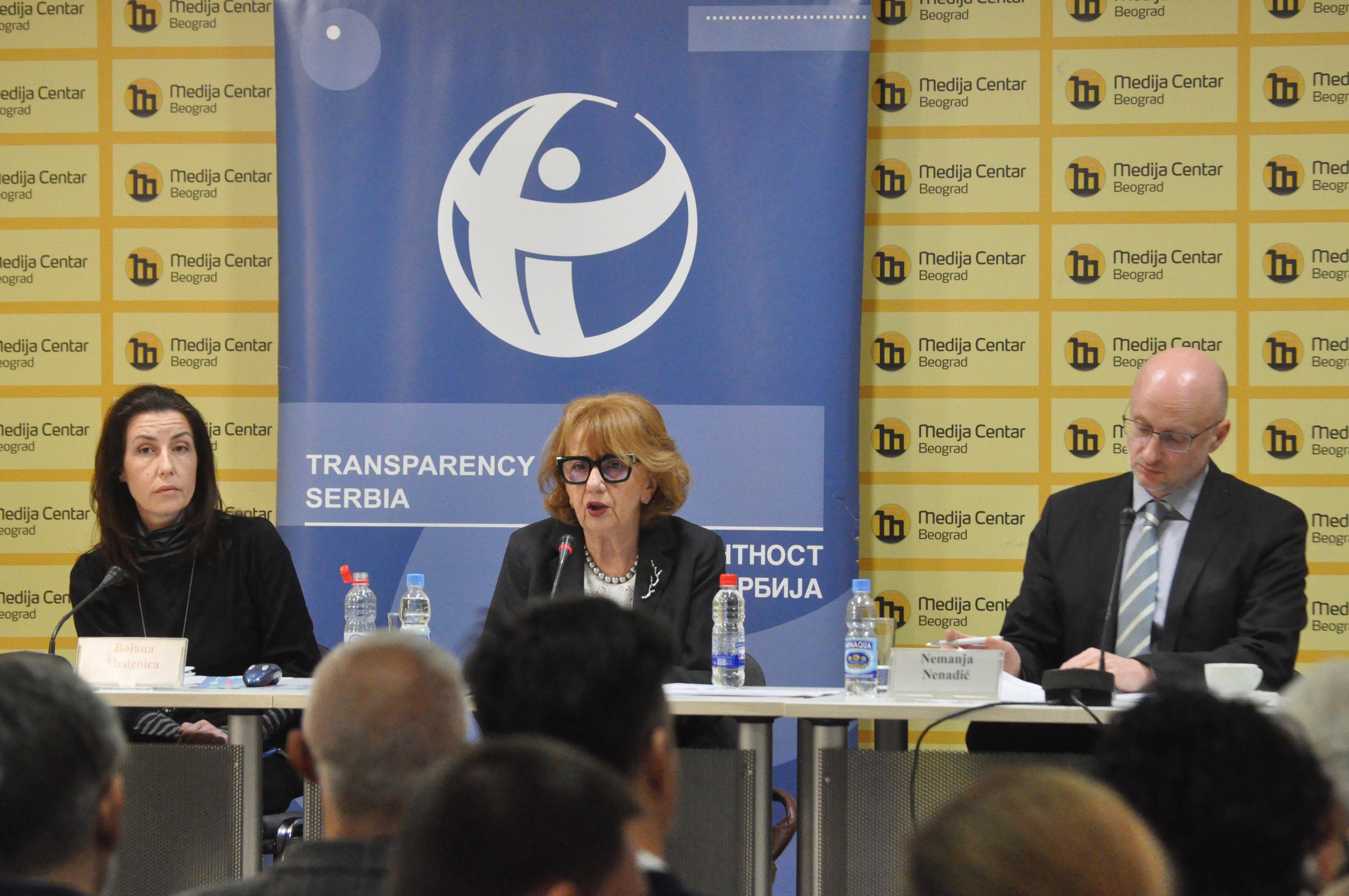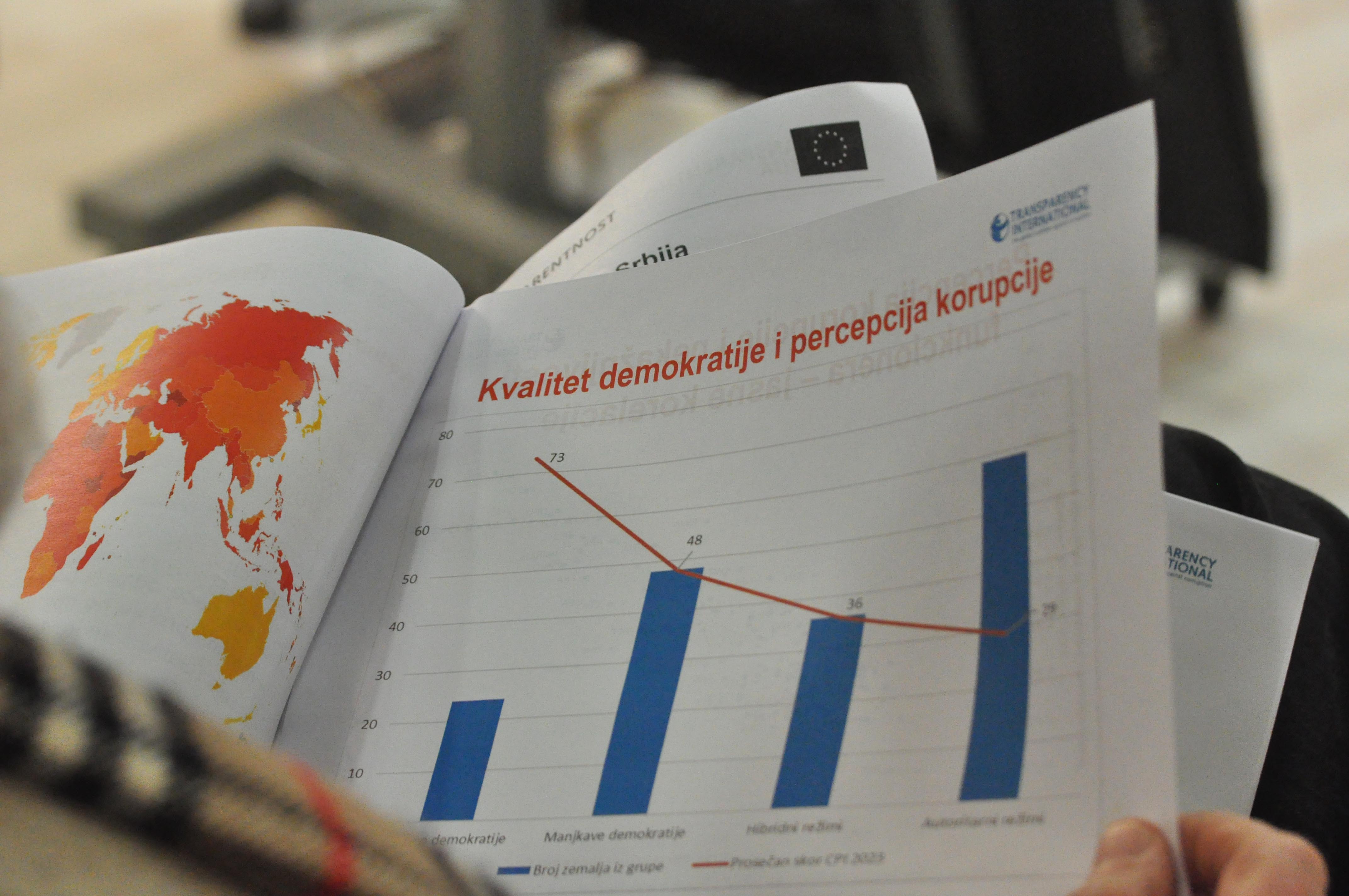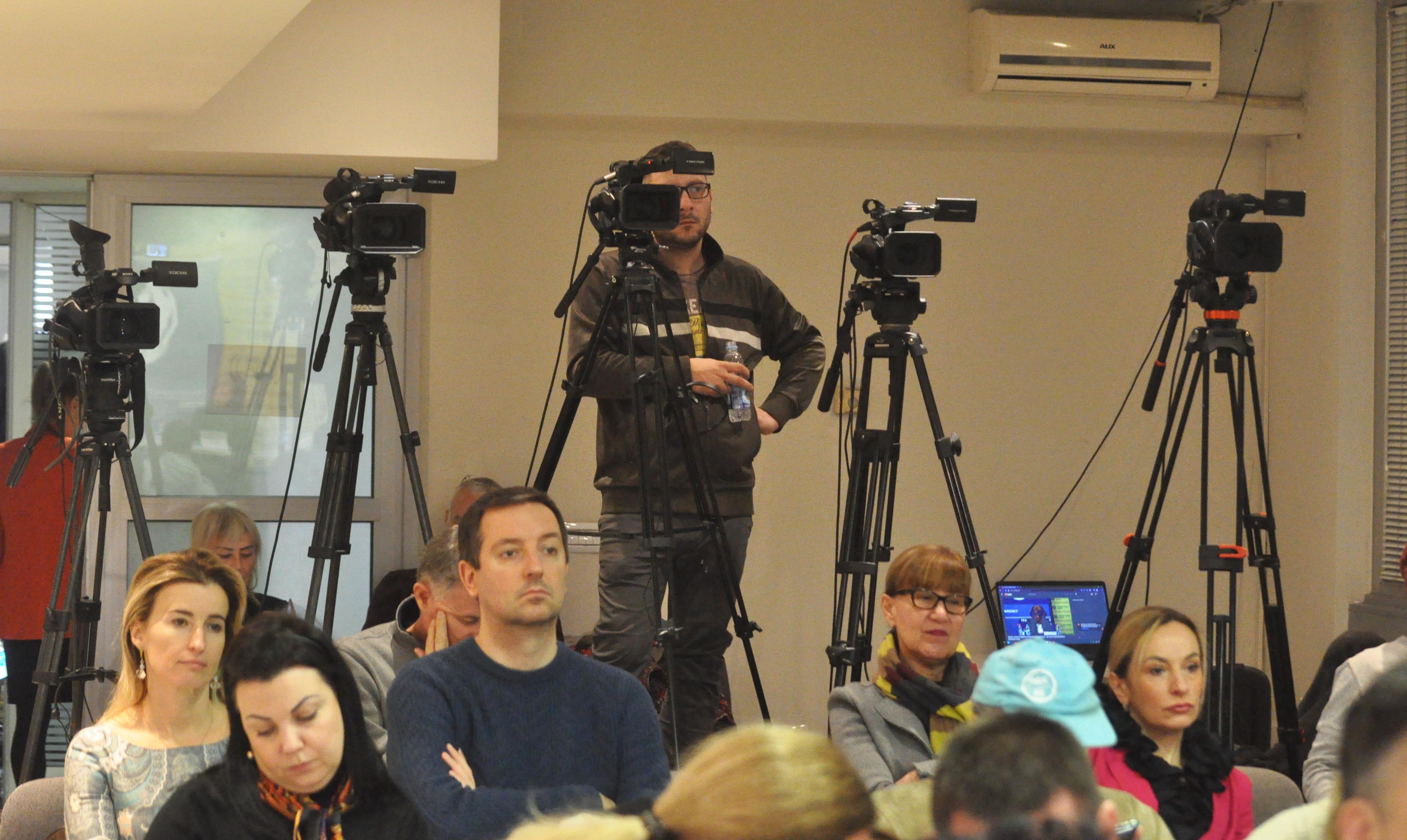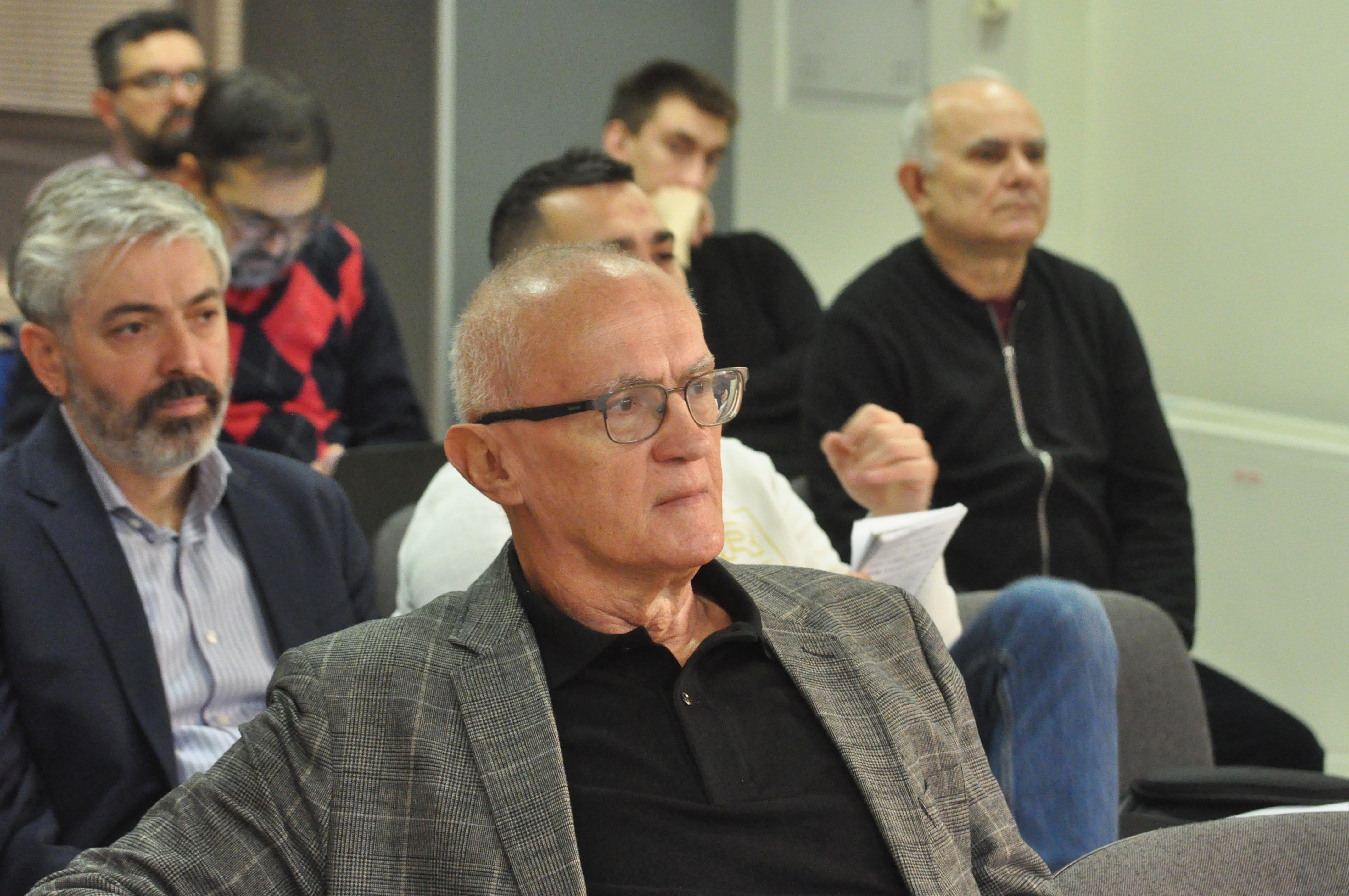Serbia continues to fall on global list of Transparency International's Corruption Perception Index
In Serbia, there is no political will to reduce corruption; the Government bypasses laws on public procurement, passes special laws for multimillion-projects that are important to it, does not adopt an anti-corruption strategy, and is increasingly distant from the rule of law. It was said at the Transparency of Serbia press conference, where the new Corruption Perception Index CPI 2023 was presented.

"There is a correlation between the index of the perception of corruption and the answer to the question of what is the chance that someone who holds a public office will be held accountable for corruption. In countries where such chances are considered small, the perception of corruption is higher," said Nenadić.
Mr Nenadić stated that the reform of the judiciary has not helped to obtain prosecutors who will independently, without waiting for the filing of criminal charges, examine all cases of suspicion of corruption or at least those that are well documented and presented to the public.
He added that the fight against corruption is not the state's priority and that no national anti-corruption strategy has existed for more than five years. In the proposal that appeared, this index was taken as a benchmark, but the Government would be satisfied if Serbia goes from the current level of 36 to 38 by 2028, which would mean that we return to the level of 2021.
The executive director of TS Bojana Medenica announced that in the CPI 2023 ranking, Serbia retained the index of 36 but fell three places on the list – to the 104th position, the worst in the last 12 years.
Serbia's CPI is seven points lower than the world average and even 28 points worse than the EU average.
Only Bosnia and Herzegovina is worse in the region, with an index of 35. Albania, with which Serbia shared the 101st position last year, is now better and has an index of 37; Kosovo, ranked separately, has 41, North Macedonia and Hungary 42, Bulgaria 45, and Montenegro and Romania 46, Mrs Medenica added.
For the sixth year in a row, Denmark is at the top of the list, with an index of 90, the same as in the previous ranking.
Nenadić also cited as one of the reasons for such a situation that the Government of Serbia openly ignores many good anti-corruption rules. It is particularly evident in the case of holding illegal acting conditions in public enterprises and state administration, as well as in contracting the most significant infrastructural works. Priorities in the infrastructure field, financed by increasingly expensive borrowing, are determined without a predetermined and adopted plan.
In this sense, he added, it is particularly noticeable that the President of the Republic makes many decisions from the competence of the Government and other state bodies. It can be concluded both from his statements and statements of nominally responsible officials who do not miss the opportunity to refer to his authority.
The most recent case is the presentation of the "Leap into the Future" program, for which it is not known whether it exists at all, who drafted it and who adopted it. Certainly, the institution of the President of the Republic could not have done it based on its powers. Before the (December 2023) elections and during the election campaign, a new wave of public expenditures was recorded, which can undoubtedly be linked to the desire to gain support for the parties in power at the expense of all citizens. Instead of tenders, direct agreements are the most dominant form of contracting for the most valuable works. A special law for EXPO Belgrade 2027 will further contribute to such practice, which excludes the application of the rules on public procurement for works with an initially estimated value of one billion euros. We hear now announcements that the cost will be much higher (13, 15, and even 17 billion euros). Transparency Serbia has submitted to the Constitutional Court an initiative to evaluate the constitutionality and legality of Article 14 of the special law, which excludes the application of the Law on Public Procurement to these works, Nenadić said.
Member of the Board of Directors of TS, Prof. Radmila Vasić, added that it can be concluded that corruption has increased in countries with less and less democracy.
"I always associate the status of the political regime with corruption. But it is also true in the reverse direction. As soon as you see that the corruption index is high, you can see that democracy is flawed, and it is a question of the deficit of democratic mechanisms in the functioning of the state. The most general reason is the absence of consideration and disrespect for the organization and functioning of the rule of law. And it took off so much, and what's worse, it became an open behaviour of state officials, she stated.
The regime does not have the political will to implement the laws, and now, as she said, it is showing what it can do by passing a new law on Expo, which will open the field for even greater corruption.

Serbia continued to fall on the list this year as well. Although the score remained the same (36), this year, it was enough for 104th place on the list (last year, 101st). We share this place with Algeria, Brazil and Ukraine. Compared to the previous year, we were overtaken by Albania, Gambia, Zambia and Kazakhstan.
With a current score of 36, as in the previous two decades since it was ranked on the CPI, Serbia is "stable" in the group of countries with widespread corruption (with a score below 50).
Denmark (90) this year retook first place, followed by Finland (87) and New Zealand (85). At the bottom, as last year, are Somalia (11), South Sudan and Syria, with 13 points; this year, Venezuela joined them.
Among the former socialist countries of Europe, Estonia is, traditionally, by far the best placed with a score of 76, while among non-EU members, Georgia has the best result (despite the drop from 56 to 54 points). Within the former SFRY, Slovenia is still the best placed, with a score of 56, the same as last year.
When calculating the CPI, 13 relevant surveys that measure the perception of corruption in the public sector are taken into account. These surveys represent the opinion or impression of those who do business with them or advise business people, governments and international institutions about the corruption of state officials and public servants. Research must be published within the last 24 months, and there must be at least three such data sources for a country/territory to be ranked.
This year, Serbia was included in eight relevant studies, which guarantees the findings' high degree of reliability. The comparability of data with those from earlier years is at an even higher level - even 11 years ago, the same seven sources of information were used for the CPI, and in the last six years, identical eight.
The project findings used for Serbia in the latest CPI came from Global Insight Country Risk Ratings, Bertelsmann Foundation, World Economic Forum, Economist Intelligence Unit, Freedom House, International Country Risk Guide, World Justice Project Rule of Law Index and Varieties of Democracy Project.





















